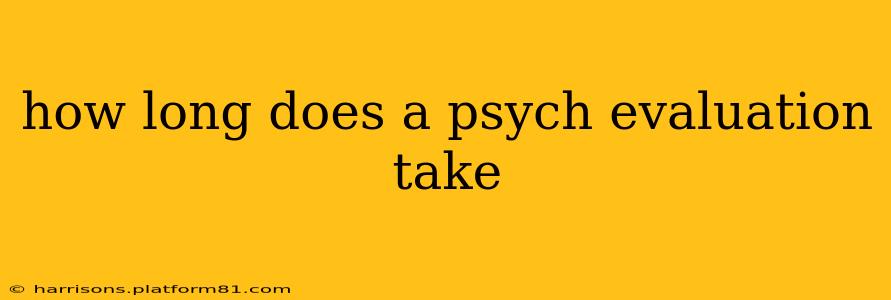The length of a psychological evaluation varies considerably depending on several factors. There's no single answer to this question, as it's a highly individualized process. This comprehensive guide will explore the factors influencing evaluation length and provide a clearer picture of what to expect.
What Factors Determine the Length of a Psych Evaluation?
Several key elements significantly impact the duration of a psychological evaluation:
-
Reason for the Evaluation: A simple evaluation for a driver's license renewal will be far shorter than a comprehensive evaluation for a disability claim or a forensic evaluation for a legal case. The scope of the assessment directly dictates the time commitment.
-
Type of Assessment: Different assessments require different amounts of time. Some might involve just a single interview, while others may require multiple sessions, psychological testing, and review of collateral information (e.g., school records, medical records). Neuropsychological testing, for instance, can be quite extensive.
-
Complexity of the Case: Individuals presenting with complex or multiple diagnoses will naturally require a more thorough evaluation than those with simpler presentations. The severity of symptoms and the presence of co-occurring conditions also play a role.
-
Clinician's Approach: Different clinicians have different approaches and paces. Some may be more thorough or detail-oriented than others, which can impact the overall time spent.
-
Client's Needs and Cooperation: A client's willingness to engage fully in the evaluation process can influence its length. If a client struggles with communication or requires frequent breaks, the evaluation may take longer.
How Long Are Different Types of Psych Evaluations?
While providing exact timeframes is difficult, here's a general overview:
-
Brief Evaluations: These might involve a single session lasting 30-60 minutes. Examples include routine screenings for employment or simple evaluations for specific concerns.
-
Standard Evaluations: These typically involve 2-4 sessions, each lasting 60-90 minutes. They may include interviews, standardized psychological tests, and review of relevant information.
-
Comprehensive Evaluations: These can range from several sessions to several weeks or even months. They often involve extensive testing, multiple interviews, and a detailed report. This type is common for legal cases, disability claims, or complex clinical presentations.
What Tests are Used in a Psychological Evaluation?
Psychological evaluations often utilize a variety of assessments tailored to the individual's needs and the purpose of the evaluation. These might include:
- Intelligence tests (IQ tests): Measure cognitive abilities.
- Personality tests: Assess personality traits and patterns. Examples include the MMPI-2-RF and the Rorschach Inkblot Test.
- Neuropsychological tests: Assess cognitive functioning, often after a brain injury or suspected neurological condition.
- Projective tests: Explore unconscious thoughts and feelings. The Rorschach Inkblot Test is a commonly known example.
- Symptom checklists and questionnaires: Self-report measures assessing specific symptoms or behaviors.
How Long Does it Take to Get Results from a Psych Evaluation?
The turnaround time for receiving the results of a psychological evaluation depends on several factors, including the complexity of the evaluation, the clinician's workload, and the need for additional consultations or review. It can range from a few days to several weeks, sometimes even longer for extensive evaluations.
What Happens During a Psych Evaluation?
A psychological evaluation typically involves several stages:
- Initial Intake Interview: Gathering information about the client's background, history, and presenting problems.
- Psychological Testing: Administering and scoring various psychological tests.
- Collateral Information: Gathering information from other sources, such as school records, medical records, or family members (with consent).
- Diagnostic Formulation: Developing a diagnosis based on the collected information.
- Report Writing: Preparing a comprehensive written report summarizing the findings and recommendations.
Remember, this information provides a general overview. The specific duration and process of a psychological evaluation will depend heavily on the individual circumstances. Always discuss the timeline and expectations with your clinician upfront.
